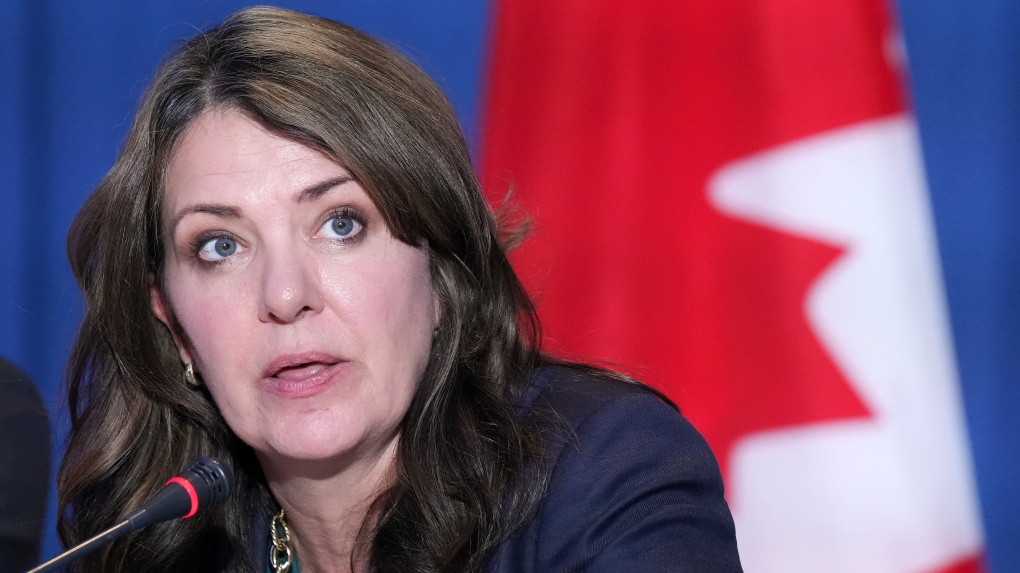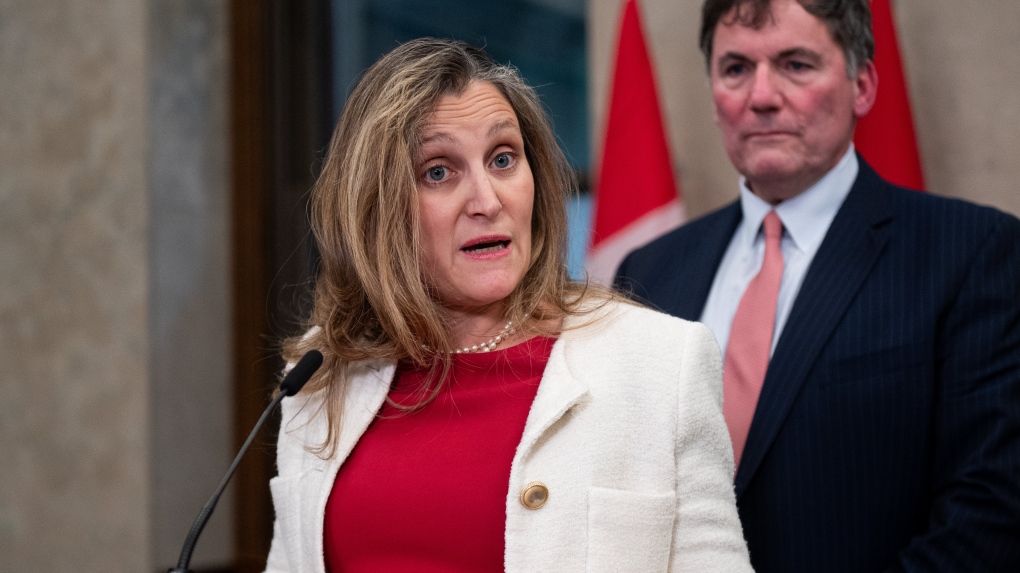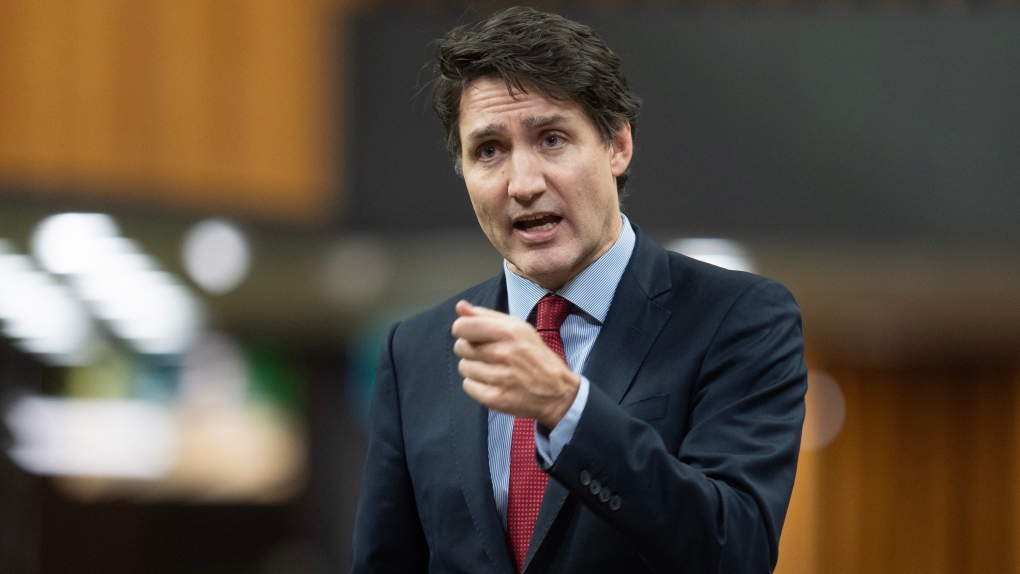Smith, premiers vow to support stability, unity in wake of federal government chaos
Alberta's premier is among provincial leaders promising Canadians stability and unity as fractures form within the federal government.
Danielle Smith said Monday at the fall meeting of Canada's premiers that she's taking away encouragement from the outgoing finance minister's resignation letter to keep working to lessen the threat of a trade war with the U.S.
"I am reading it as, "Please keep going, premiers. Please keep meeting. Please keep reaching out to governors," Smith told media on Monday in Toronto, site of the Council of the Federation meeting.
On the same day she was set to deliver an economic statement, Chrystia Freeland resigned from her federal cabinet post as finance minister, joining housing minister Sean Fraser. Senior cabinet minister Dominic LeBlanc was sworn in as her replacement in the finance portfolio on Monday afternoon.
That triggered a cabinet shuffle, followed by a fiscal update with a much bigger deficit than projected.
In Freeland's absence, Government House Leader Karina Gould tabled the government's long-anticipated fall economic statement in the House of Commons – on the second last day of the House of Commons fall sitting, without a speech. It showed a deficit of $61.9-billion for 2023-24.
The major shakeup and the political uncertainty it prompted has revived calls for Prime Minister Justin Trudeau to resign, both from other party leaders and within his own caucus.
 Alberta Premier Danielle Smith speaks to the media during the fall meetings of Canada's premiers hosted by Ontario in Toronto, Monday, Dec. 16, 2024. on Dec. 16, 2024. (Nathan Denette/The Canadian Press)While Parliament Hill in Ottawa was embroiled in chaos, the provincial leaders in Toronto insisted they are confident in their abilities to meet incoming U.S. President Donald Trump's demands and avoid potential 25-per-cent tariffs on all Canadian goods regardless of what is happening federally.
Alberta Premier Danielle Smith speaks to the media during the fall meetings of Canada's premiers hosted by Ontario in Toronto, Monday, Dec. 16, 2024. on Dec. 16, 2024. (Nathan Denette/The Canadian Press)While Parliament Hill in Ottawa was embroiled in chaos, the provincial leaders in Toronto insisted they are confident in their abilities to meet incoming U.S. President Donald Trump's demands and avoid potential 25-per-cent tariffs on all Canadian goods regardless of what is happening federally.
"As a group, we have identified border security issues around fentanyl, around gun smuggling, human trafficking, illegal migrants," Smith said. "It's why we've identified the two-per-cent NATO commitment, and it's why we've identified that not allowing China to use our country or Mexico as a back door to put cheap goods into America."
In a letter posted online, Freeland cites concerns about Canada's economic stability amid tariff threats, writing "that means eschewing costly political gimmicks, which we can ill afford."
It came hours before she was set to deliver the federal fall economic statement.
"I just want to wish her all the best, but as a country, we have to project strength," Ontario Premier Doug Ford said Monday.
 Minister of Finance and Deputy Prime Minister Chrystia Freeland delivers remarks on Parliament Hill in Ottawa on Dec. 11, 2024. (Spencer Colby/The Canadian Press)Edmonton-based political scientist Brendan Boyd says it's smart for premiers to project a message of unity but adds they need a stable partner in Ottawa.
Minister of Finance and Deputy Prime Minister Chrystia Freeland delivers remarks on Parliament Hill in Ottawa on Dec. 11, 2024. (Spencer Colby/The Canadian Press)Edmonton-based political scientist Brendan Boyd says it's smart for premiers to project a message of unity but adds they need a stable partner in Ottawa.
"It's great that the premiers are trying to move on in the midst of this uncertainty in Ottawa, but it's going to be difficult because the federal government is the place where most of these big decisions and representation of Canada takes place, and right now, there a lot of focus on internal party politics," Boyd told CTV News Edmonton on Monday.
Boyd said talk of a federal election in hopes of establishing political stability before Trump takes office in late January "would be a lot" for Canadians to take on during the holiday season.
"It would be fairly unprecedented to have an election over the Christmas holidays, which signals the extent of how serious this is and how unprecedented it is," said Boyd, an associate professor of political science at MacEwan University.
"It doesn't send a good message to the Americans or Canadians. Frankly, thinking about Canadians, they don't want to be thinking about this over the Christmas break. It's a time to not think about some of these things and get away from it all.
"It would be pretty unfortunate, I think, on all levels if we're going into an election in the next couple of weeks."
 Prime Minister Justin Trudeau responds to questions from the opposition during Question Period, Tuesday, Dec. 10, 2024 in Ottawa. (Adrian Wyld/The Canadian Press)Economist Trevor Tombe estimates 25-per-cent tariffs could cost Canada's economy $60-90 billion a year while further threatening a possible recession in 2025.
Prime Minister Justin Trudeau responds to questions from the opposition during Question Period, Tuesday, Dec. 10, 2024 in Ottawa. (Adrian Wyld/The Canadian Press)Economist Trevor Tombe estimates 25-per-cent tariffs could cost Canada's economy $60-90 billion a year while further threatening a possible recession in 2025.
He told CTV News Edmonton on Monday that when economic uncertainty rises, business investment tends to fall, which "slows the growth of productivity, slows the rate of economic growth, slows the pace of wage and salary increases. It's just bad all across the board."
"Whether or not tariffs are implemented, the mere threat of them creates uncertainty," the Calgary-based Tombe said. "That's a drag on investment, that's a drag on growth and productivity, and we would see that next year, almost regardless."
With files from CTV News's Rachel Aiello
CTVNews.ca Top Stories

Trudeau considering his options as leader after Freeland quits cabinet, sources say
Chrystia Freeland, Canada's finance minister, said in an explosive letter published Monday morning that she will quit cabinet. Here's what happened on Monday, Dec. 16.
'We're not united': Liberal caucus meets, as PM Trudeau faces fresh calls to resign in light of Freeland's departure
The federal Liberals called an emergency caucus meeting Monday night, as Prime Minister Justin Trudeau faced renewed calls from some members of his party to resign. As MPs emerged, the message was mixed.
'Eventful day,' Trudeau says after Chrystia Freeland quits cabinet, LeBlanc tapped to replace her
In a stunning move, Deputy Prime Minister and Finance Minister Chrystia Freeland announced her resignation from Justin Trudeau's cabinet on Monday, after the prime minister told her he no longer wanted her in the top economic post. After hours of turmoil, Dominic LeBlanc, was sworn-in as her replacement in the finance portfolio.
Feds deliver fall economic statement with $61.9B deficit for 2023-24, amid political turmoil
Amid the news that Chrystia Freeland has resigned from her cabinet position as finance minister, the Department of Finance on Monday unveiled the long-anticipated fall economic statement, which reports a deficit of $61.9-billion for 2023-24.
W5 Investigates Connecting the dots on a landlord scam: how clues revealed a prolific con artist at work
In part one of a three-part investigation, W5 correspondent Jon Woodward reveals how a convicted con artist bilked dozens of people in a landlord scam.
Judge rules Trump does not have presidential immunity protections in hush money conviction
Donald Trump's felony conviction in the New York hush money case should not be tossed out because of the Supreme Court's ruling on presidential immunity.
Canadian hero Terry Fox to appear on next $5 bill, officials announce
The federal government is paying tribute to one of Canada's greatest heroes by adding Terry Fox to the next $5 bill.
Wisconsin school shooter who killed teacher, student was 17-year-old girl, police say
A teenage student opened fire with a handgun Monday at a Christian school in Wisconsin, killing a teacher and another teenager during the final week before Christmas break. The shooter also died, police said.
Travel risk: Which countries does Canada recommend avoiding?
Canadians planning to travel abroad over the holidays should take precautionary steps to ensure they're not unintentionally putting themselves in harm's way.































